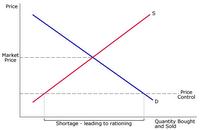 The biggest draw for me about economics is the potential value it has in understand what actions and policies can improve the quality of millions of lives around the world. (And avoiding policies that harm people.) Along these lines, here is a comment today by GMU Professor Pete Boettke:
The biggest draw for me about economics is the potential value it has in understand what actions and policies can improve the quality of millions of lives around the world. (And avoiding policies that harm people.) Along these lines, here is a comment today by GMU Professor Pete Boettke:To illustrate this point, Pete links to this post by Larry White about price controls on bread in Zimbabwe:
Most public policy discussions are really about basic economics. If we just got rid of the policies that cut against basic economics, then the lives of millions would be improved around the globe. And when I say basic economics, I mean the most basic things --- like price controls on food products, or restrictions on trade, or regulations on entry.
Just the first few weeks of Econ 101 and yet we see policies throughout the world that prove to be detrimental to the lives of so many continue to be implemented by governments (both left and right, and democratic and non-democratic). If only we could pick off the low hanging fruit of public policy, then much misery would be avoided.
Like Pete said, following just the basics from Econ 101 have the power to improve the lives of millions around the globe. This is why I think adding basic economics to high school and college curriculum is so important.
Repeat after me, class: price control causes a shortage. A government that tries to help consumers get bread by forcing its price down in fact makes it harder for consumers to get bread. In Zimbabwe this week, Voice of America reports:Bread has become hard to find since the government ordered bakers last week to roll back prices and sell loaves at the official price of Z$200 dollars. Bakers have had to import their own flour and say the official price doesn’t let them recover costs.
Interestingly, I'd also love to see it as part of a course offering for seminary students. Christianity is a powerful moral motivator for many Americans and I think it would be awesome to see church leaders who have a firm grasp of economics leading their congregations in ways to produce effective change. (And avoiding ways that don't.) Of all people, it seems like Christians with a desire to love their neighbor should be the most ardent proponents of things like free trade, avoiding price controls, etc.
I think Public Choice (the economics of politics) also offers some good food for thought about what government should and should not be used for, particularly if you sincerely believe politicians are sinners, just like everyone else. It seems as if the Founding Fathers viewed the concept of sin as one of their key factors in why they wanted to have limited government. They distrusted too much power in the hands of any man because they believed men are corruptible. I wonder why so many churches in America are now so keen on trying to use political power to effect change without thinking about this?
Here is a Power Point presentation I've used to teach seminary students in India and a microfinance organization in Moldova on how to use economics in ministry. I'd love to see more Christians involved in actively trying to communicate economic ideas within the Christian community.
No comments:
Post a Comment